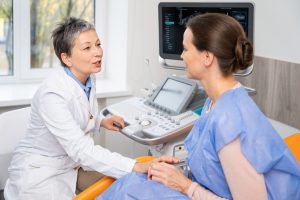A Spotlight on Women’s Health
Women’s health care requires specialized screenings and patient cognizance of potential risks at any age—but early detection and treatment advancements can minimize the severity of reproductive health-related cancers.

Carly Murray
Modern women’s health care has progressed due to technological advancements, medical research and minimization of societal gender bias. However, there is still a lot of ground to cover to ensure all women have equal access to education and medical services. As women’s reproductive health has been a major focus in news media this year, it is essential to understand the multitude of care options within this category and how they are differentiated—as many are simply protocols designed to address the most common diagnoses doctors see in their women patients.
“I have seen women become more empowered in their choices in health care compared to years past, where they were told what to do without being given options. We have become a more inclusive society when it comes to women … less focus on just reproductive health and more emphasis on the whole person. … There are more interventions to improve their quality of life both physically and emotionally,” explains Dr. Deborah Lauridsen, Orlando Health Physician Associates-Oviedo.
Dr. Lauridsen explains that despite the benefits of these new inventions, some technologies have allowed patients to skip regular methods of consultations, prescriptions and treatments—leading to less accurate or consistent care. One such example she provides is birth control that is prescribed over the internet or through a Telehealth appointment. If a prescription is not specially catered to an individual and her medical history, there may be complications, and this is more difficult to assess without a physical exam.
Education for women about their own reproductive health ultimately provides a lifelong understanding of what to be conscious of, risk factors and signs. Regular checkups and screenings are especially important, as some ailments don’t necessarily have recognizable symptoms.
The complications that may be associated with womanhood are often addressed even before its onset, as the HPV vaccine that protects against the most dangerous strains is administered as early as 9 years old. While it is difficult to imagine a future for which this protection is necessary that early, HPV—the leading cause of cervical cancer—is rampant among sexually active young adults, but primarily only has a detrimental risk for women and only women can be tested for it. Its transference rate is high as it can still be transmitted with contraceptives during any type of sexual contact.
Despite the success of the vaccine, there are over 200 different strains—some of which are related to precancer. If untreated, precancerous cells may develop into cervical cancer later in life, but it can be rapidly and completely treated if found through early detection screenings and depending on its progression. This is something that women’s health medical professionals are actively researching and keeping an eye on as more than 42 million Americans have HPV, according to the CDC.
“Women should get screened biannually for breast cancer with mammography starting at age 40, and get regular pap smears every three years starting at age 21,” advises Dr. Lauridsen.
This virus is found during regular Pap smears, and the severity of the cells identified within a cervical exam will determine a woman’s health care plan for her future. In the past, women commonly underwent surgical intervention when high-risk cells were found. Now, gynecologists will run more in-depth screenings and administer regular monitoring of at-risk patients such as annual Pap smears instead of the routine once-every-three years.
Breast cancer signs, in contrast, are more detectable and can be found without a doctor. Women will often receive breast exams from their medical practitioner without mammography during a regular gynecological exam, but it is integral that they know how to regularly check themselves for any irregularities regardless of age. This self-check consists of firmly pressing in a circular motion to feel for any abnormality, as well as examining visually for any changes.
“We partner with the Florida Department of Health for a program that’s state and federally funded, and we actually use their mobile mammography vans and we educate folks on the fact that if you receive your mammogram through this program—the Breast Cancer and Cervical Cancer Early Detection Program—and if you receive your diagnosis through the program, then you are guaranteed a continuum of care. If you are diagnosed outside of that program and don’t have insurance, you cannot get into the program,” says Tracy Jacim, president and CEO of the Florida Breast Cancer Foundation.
According to the National Breast Cancer Foundation, one in eight U.S. women will develop breast cancer in their lifetime, making it the second most common cancer among American women after skin cancer. Yet, not all of these woman can afford the necessary labs, appointments and treatment.
“If you give someone a mammogram and you’re going to give them a diagnosis, but they have no way of getting care, that doesn’t really do very much. It’s so important for people to know if they get the mammogram underneath the umbrella of this program … a continuum of care is guaranteed,” continues Jacim.
As a clearer understanding of not only women’s health, but the accessibility of care, guides the modern scope of reproductive health care, fatality rates of related cancers will increasingly curtail. Furthermore, the mental health detriment from a diagnosis can sometimes be mitigated by knowing one is not alone as the stigma diminishes and more women are empowered to speak about their all-too-common medical battles.
Woman’s Health & Wellness Directory
|
BIRTH & GYNECOLOGY Tree of Life Birth & Gynecology
BREAST CANCER SUPPORT Florida Breast Cancer Foundation
DENTAL Mid-Florida Endodontics Phantastic Smiles
DERMATOLOGY Associates in Dermatology
|
HEALTH CARE AdventHealth for Women Community Health Center HCA Florida Healthcare Orlando Health Physicians Associates
OPHTHALMOLOGY Florida Retina Institute
|







